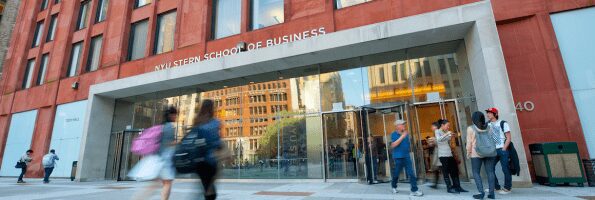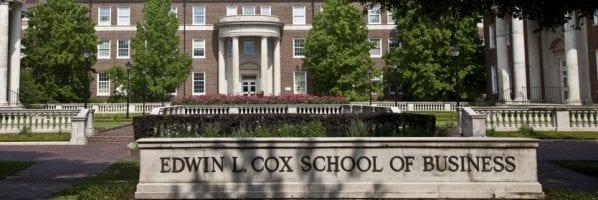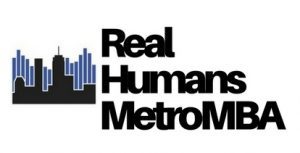5 Questions With UC Davis MBA Admissions Senior Director Andrea Shaw

In our latest installment of the MetroMBA “5 Questions” series, we speak with Andrea Shaw, Senior Director of Admissions at the UC Davis Graduate School of Management. Shaw discusses the tight-knit culture of the UC Davis MBA program, what students can expect, and what qualities define the program.
How does UC Davis help MBA applicants who don’t come from a traditional business or quantitative background?
“Students come to us from across industries, functions, and from around the world. We pride ourselves on being a tight-knit and collaborative community where conversations directly happen between faculty, staff, and students. Our curriculum also allows students to choose between many different career paths especially given the connections we have across other UC Davis schools.
For students coming from a non-business background or who are nervous about starting, we’re a school that really fits. Many schools have 600 students in a full-time program. We only have 50 students. That allows us to personalize the journey of each student.
Also, UC Davis doesn’t believe in just throwing our students into the program. We get to know our students and their needs—what they’re looking for, their strengths, weaknesses, etc. Part of that knowledge comes from our highly robust orientation where we spend almost a month before school starts to really engage with our students.

Andrea Shaw, Senior Director of UC Davis Graduate School of Management Admissions
During orientation, we spend a tremendous amount of time learning about our MBA class. There’s a significant career focus with discussion topics focused on networking, resume building, LinkedIn, etc. However, what the orientation is most known for is helping our students understand their emotional intelligence and develop their story through exercises and experiential learning.
Students have said in surveys that it’s the orientation that solidifies that they’ve made the right decision to come here. Those first few weeks are critical for setting them up for success.”
What type of culture defines UC Davis?
“The two words that continually come up from students, alumni, and faculty are “kind and compassionate.” We are driven toward success, but nice. It’s the idea of compassionate leadership, which research has shown to be necessary for true business growth. We even have an entire series that students can take to develop these skills, including awareness of themselves and others. Kindness and compassion are woven into every aspect of our culture, starting at the top with our dean.
Our culture is also defined by our location in a college town instead of a city. I love Davis as a city, community, and a place to go to college. It’s safe, comfortable, and all the energy revolves around the college.
We’re also really focused on what we do best as a university—biotechnology, sustainability, agriculture. Those sorts of segments and industries are very tied to our culture, university, and research. So, someone interested in Wall Street finance might not fit as well as someone interested in biotech.
Finally, because we’re a small community, you can really stand out. There are not a lot of politics to hold you back. You can get very involved, and there are fewer people vying for the same positions, so you can do as much as you want. This is highly beneficial for students who have a particular passion that they want to explore. For example, I know an MBA student who started a Women in Leadership organization because that was something she was passionate about, and it happened in a few conversations.”
Can you describe the qualities that UC Davis students possess?
“Other than the typical GMAT scores, GPA, and years of work experience, we look for applicants who know what they want to do with their MBA. Candidates should have a focus for the post-MBA career while also remaining open-minded about new opportunities. After all, an MBA is meant to be a transformative experience.
We also look for highly competent individuals who are professional in their verbal and written communications with us. We pride ourselves on being able to find jobs for all our students, so there’s a benchmark we look for—well-rounded students that have many different qualities. Going back to this idea of collaborative and kind, we look for candidates who are good team players and who see the value of working in groups because we have a lot of group work.
Finally, we look holistically at the class and how everyone will learn from each other. We look for a diverse class with students from a wide variety of backgrounds and industries. Everyone should be unique while still representing the essential qualities we love: kindness, compassion, and collaboration.”
If you could give one piece of advice to an MBA applicant interested in UC Davis, what would it be?
“Confidence! So much of what MBAs lack is confidence. The problem is that if you don’t think you can succeed, you won’t.
When you fill out your application and come in for your interview, we want confidence. Confidence is doing your research (knowing UC Davis), knowing who you are, and knowing your story. It’s also about being authentic. All of that leads to being confident in who you are and what you want. That will come across with us; it will come across anywhere.

“Confidence! So much of what MBAs lack is confidence. The problem is that if you don’t think you can succeed, you won’t,” Shaw says.
Remember, first impressions matter. That’s where that confidence helps too. If you come into a situation confidently, those first impressions are strong.”
What is your favorite San Francisco-focused business blog/website?
“I would say for applicants who are looking at schools in the Davis area, Metro-Edge.org is an excellent website. This is a website for young professionals in the Sacramento area. You’ll find events, gatherings, news, and more. It’s really focused on change and responsibility, and that’s great.
I also have to give a little plug to all of our social media accounts. Follow us on LinkedIn, Twitter, and Facebook for the latest news and insights. We also have MBA Showcase days coming up on January 26, February 9, and Feb 23.”
4 MBA Trends to Look Out For In 2019

Recently, we discussed about most important numbers of the previous year. MBA application rates were declining, average salaries are on the upswing, gender equity took major steps, technology and products/services jobs are jumping, and GMAT scores continue to rise. But what does all this mean for 2019?
Are there any MBA trends to look out for in 2019 and what can you expect? Continue reading…
The Big Picture: The 5 Most Important MBA Numbers of 2018

Each year there’s a ton of new information that comes out about MBA programs. From new rankings to the latest GMAC news, there are a thousand little tidbits that can overwhelm applicants, students, and alumni. We’ve collected the most important MBA numbers of 2018.
To pare down the news into the information you need to know, we’ve taken a look at the big picture of the MBA for 2018 and outlined the five most important pieces of data you need to know. We’re talking about everything from the decline and U.S. MBA applications to the increase in female enrollment, the higher salaries and GMAT scores, as well as the increase in interest in technology. Continue reading…
No GMAT? Check Out Some of Our Favorites Schools that Offer Waivers

Applying to MBA programs can be a labor intensive and overwhelming task, and one may wonder how necessary it is to add the GMAT to an already lengthy to-do list. It’s important to note that the GMAT helps admissions boards to efficiently gauge a student’s overall readiness for the MBA in comparison to other applicants, regardless of the rigor of their undergraduate work. Also, b-schools use the average GMAT of successful applicants in order to bolster their rankings in certain publications. Some programs do, however, accept GMAT waivers.
Here is a look at some top schools that do not require GMAT scores, along with a summary of their waiver requirements.
The Rutgers Business School offers MBA students to forego the GMAT or GRE if they have eight or more years of professional experience and an undergraduate GPA of 3.0 or higher. Students with a Master’s degree and at least five years of full-time work experience may also apply without taking the GMAT.
La Salle University has several possibilities for students who have not taken the GMAT. Potential MBAs can obtain a waiver if they have graduated from an AACSB-accredited school with a minimum cumulative GPA of 3.2; a minimum GPA of 3.0; and three years of work experience. La Salle’s MBA program director evaluates each applicant’s work experience to determine whether the waiver may be granted.
Applicants with a CPA license or a CFA Charter may also apply without the GMAT, as may those with a Ph.D. or a Master’s degree or higher from an accredited institution. A cumulative GPA of 3.0 or higher is required for applicants with a Master’s degree.
LaSalle also has a ‘qualified admission’ option in which a student with two years’ work experience and a GPA of 3.0 or higher from an accredited school can waive the GMAT requirement. Qualified students may take up to four MBA courses, and with an overall GPA of 3.3, will not be required to take the GMAT. ‘Conditional Acceptance’ is also an option, in which a limited number of students are admitted for one semester, but then must take the test in order to remain enrolled and gain financial aid eligibility.

University of Delaware’s Lerner College of Business and Economics gives waivers to MBA students if they possess a terminal degree (Ph.D., MD, or JD, for example) or if they have four or more years of professional experience at the full-time level. Other conditions under which a student may apply with no GMAT are a minimum undergraduate GPA of 2.8; a minimum grade of ‘B’ in two non-introductory level statistics or calculus courses; and an acceptable level of writing ability and English proficiency.
Lerner also grants exceptions to the GMAT requirement for undergraduates of the school who have fewer of four years of work experience and a GPA of 3.0 or higher, in addition to ‘B’ grades or better in 200 level statistics or math courses.

The Pace University Lubin School of Business MBA admissions board considers waivers of GMAT scores for students with a 3.2 GPA or above for all undergraduate coursework. For those applying to the one year fast track MBA in Financial Management or Marketing Management, applicants need a cumulative GPA of 3.3 or above and a B grade or better in all undergraduate business courses.

Babson College’s F.W. Olin College of Business offers GMAT waivers to all applicants to the Blended Learning MBA program, as students applying to this track are required to have extensive work experience. Additionally, those applying to Babson’s evening MBA do not have to submit GMAT scores in certain circumstances, such as a grade of ‘B’ or better in two or more quantitative undergrad and/or graduate courses or exhibited quantitative and analytic skills in a work setting.
Babson evening MBA applicants who have a professional certificate with a quantitative focus such as a CPA or CFA may also apply without taking the GMAT. Other instances in which evening MBAs may apply without the test are a 3.0 GPA or greater throughout their undergrad degrees, a prior degree from Babson, or completion of Babson’s Certificate in Advanced Management (CAM) program.

The GMAT requirement may also be waived at DePaul University’s Kellstadt Graduate School of Business if an applicant meets some specific criteria. With a bachelor’s degree from an accredited university along with five years of work experience, a student may petition for a waiver. Work experience must include both management and quantitative responsibilities.
Like other programs mentioned above, the GMAT may not be required if a student already has a PhD, JD or MD, or a Master’s degree in finance. An LSAT score of 160 or higher along with an undergraduate degree, or completion of all parts of the PE exam may also exempt an applicant from the GMAT requirement.
Students applying to the part-time MBA program who have attended DePaul’s Driehaus College of Business for their undergraduate work may receive a waiver with a minimum GPA of 3.2 and at least two years of work experience.

Suffolk University’s Sawyer School of Business allows students who have taken the CPA exam to request a waiver, and also those who have taken the first level of either the CFA or the FRM exams. Second semester seniors and undergraduate business students applying for an MBA may waive the GMAT with a cumulative GPA of 3.3 or greater.
Students with work experience and certain GPA requirements may waive the GMAT; those who have worked for two years in a relevant position with an average grade point of 3.4 may request a waiver, as can those who have four years of work experience and a 3.3 GPA. With six years of work experience and at least a 3.2 GPA, an applicant may also waive the submission.
Law school graduates (from ABA approved schools), along with MSA, MSF, MSBA or MST from an AACSB approved institution are eligible for waivers. Sawyer allows MBA applicants who are in their second senior semester of undergraduate music management at Berklee College to request a GMAT waiver as well, provided the student maintains a 3.3 minimum GPA. Recent Berklee graduates may also request exemption from the GMAT requirement.

Golden Gate University’s Edward S. Ageno School of Business has several options for students who wish to apply without the GMAT. Those with a Master’s degree or higher from any accredited US institution may be exempt, along with any applicant with a 3.5 GPA or greater during undergraduate studies. Applicants with a CPA or other professional license may also petition for the waiver.
Any applicant with proven work experience of five years or more and/or management experience are eligible to waive the submission with approval from the Dean.

At UNC’s Kenan-Flagler Business School, applicants with a CPA or CFA license are eligible for waivers, as are those with a Master’s or Ph.D. in a technical field. Kenan-Flagler does not list minimum GPA requirements for eligibility, and professional experience is evaluated on a case-by-case basis.
It’s also important to note that Executive MBA programs typically offer GMAT waivers. However, applicants usually possess extensive management experience before enrolling.
NYU Stern Director of Admissions Answers 5 Questions

In our latest installment of the MetroMBA “5 Questions” series, we speak with Lauren Calio, Director of MBA Admissions at NYU Stern. She was kind enough to respond to our questions and share insight into what it’s like to attend Stern for an MBA.
1. How would you describe the culture of NYU Stern? Is it more collaborative or competitive?
“The culture at NYU Stern is absolutely collaborative. So much so that “Collaborative Community” is one of our four core values. We believe that collective efforts lead to greater success both inside and beyond the classroom. As an example, we often hear stories of students helping their classmates prepare to interview for roles that they themselves are also interviewing for. If they are not hired for a role, they want another Sternie to get that position. Another one of our core values is ‘IQ + EQ.’ Because we seek exceptional individuals with not only intellectual strengths but also high emotional intelligence, a collaborative spirit and desire to drive change together is ingrained in our student body, faculty, and administrators.”
2. What type of student is the best fit for NYU Stern’s MBA program?
“Students come to Stern with a passion for the School and experience from a wide range of industries and functions, and they aspire to land in a variety of post-MBA roles. Some are career switchers, others are not. Regardless of their experience or career goals, applicants should be able to highlight and quantify their accomplishments and clearly explain to the Admissions Committee their career goals and how they plan to achieve them. Beyond work experience and goals, a common thread among our students is their high emotional intelligence or EQ, and engagement in our collaborative community. We also pride ourselves on being a school where everyone can be themselves. Our students’ interests outside of the classroom are also vast, as evidenced by our 30+ student clubs serving professional, affinity, sports, and special interest areas.”
YOU MAY ALSO LIKE: GMAT Scores, International Students Jump at NYU Stern
3. If there was just one piece of advice you could give to an MBA applicant considering NYU Stern, what would it be?
“Connect with the Stern community. Get to know our community and our culture by speaking to current students, alumni, and the admissions team; attend a class visit; explore campus by coming for a tour and information session. This will help you picture yourself at Stern. If you are not able to make it to New York, you can connect with our current students virtually. They can share their experiences and provide an honest perspective on how their time at Stern has helped them grow both personally and professionally.”

“If you are not able to make it to New York, you can connect with our current students virtually. They can share their experiences and provide an honest perspective on how their time at Stern has helped them grow both personally and professionally.”
4. How accessible are NYU Stern professors? Do they frequently serve as mentors?
“Stern professors are very accessible. We have over 300 faculty members across industries, which means that students can connect with faculty in the areas they are passionate about. Faculty members are available to students and are often involved with projects and experiential learning opportunities, what we call Stern Solutions, working alongside students. Our faculty include top researchers, four Nobel laureates, and senior business leaders, some of whom are working in industry by day. My advice to students is to take advantage of this accessibility to build relationships while you are at Stern that will extend beyond your time here. Make your professors a part of your network.”
5. Where can you get the best NYC pizza near campus and where’s the best coffee shop for studying?
“These questions come up frequently in our office, and every person has a different answer. Being in the heart of NYC, we are surrounded by an abundance of pizza places and coffee shops. One of my favorite places to sit and get a pie is Numero 28. Their pizzas come in different sizes (up to 29”!), and you can mix and match toppings. Kopi Kopi is a cute coffee shop on West 3rd Street, right near campus.”
Real Humans of the SMU Cox School of Business

After 100 years, one can expect a few changes.
The Southern Methodist University Cox School of Business, nearing it’s centennial celebration, is a perfect test-case for how much change can mean. Founded in 1920 as the Department of Commerce, the Dallas metro business school has gently evolved from a modern Methodist research beacon into one of the most transformative schools in Texas.

With over 11,000 students at SMU, including 5,170 graduate students, the Cox School of Business hosts nearly 600 MBAs in its various programs. For any Cox student, one of the definitive advantages of the business school is the advantageous proximity to Dallas’ thriving business community. Ten companies in the metro land within the Fortune 500 ranking. Among the group, four companies—Exxon Mobil, AT&T, Energy Transfer Equity, and American Airlines Group—land in the top 100, with two in the top ten. With high national regard, including a top 50 ranking for the school in U.S. News & World Report, plus the bevy of major companies as neighbors, these factors can seem overwhelmingly beneficial to a successful career.
When talking with members of the SMU Cox School of Business Professional MBA class, however, the allure of the program went beyond the obvious career benefits that Dallas can offer. For any well-regarded business school, the makeup of the class can seem familiar. The average GMAT for the PMBA Class of 2019 is 613. The GPA is 3.3. Most of the group has about five years of prior professional experience before enrollment. But just going off the bare statistics hardly tells the entire story.
To get a greater understanding of the SMU Cox School of Business Professional MBA class, we spoke with several current students, including a self-described “Army Brat,” a former law school student, and a consultant originally from Kathmandu, along with a handful of other future grads. Read on to see their stories and what the future may hold for life after an MBA.


